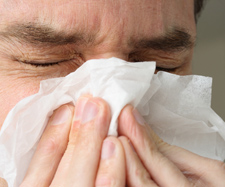Facts about you and the flu
If you’re reading this, chances are that you or someone you care about has the flu. It can knock you off your feet for days and leave you feeling exhausted. But by arming yourself with more information about this common ailment, you can get through the experience with minimum discomfort.

Tips at-a-glance:
- The flu is caused by influenza viruses and is infectious three to seven days from onset
- The virus is transmitted through air (coughing, sneezing) and surface contact (doorknob or telephone)
- Most sufferers experience a sudden onset with headache, chills, cough, fever, runny nose, sneezing, throat irritation
- Flu season is commonly November through to May
- Frequent hand-washing helps prevent its spread
- Vaccination is the only proven effective method of prevention
- Treat symptoms with fluids and rest
About the flu
While the term "flu" is often applied to almost anything that makes us feel unwell, the flu is really a specific infection caused by influenza viruses and is usually a more severe illness than the common cold.
There are two main types of "flu": influenza A and influenza B. Influenza A usually causes more severe illness than influenza B and can result in pneumonia, hospitalization or even death, especially in the elderly and those with chronic illnesses.
Symptoms similar to the flu can also be caused by respiratory infections such as respiratory syncytial virus (RSV) and parainfluenza viruses. These viruses primarily affect young children but can re-infect adults. They tend to be present in varying degrees every winter.
Flu transmission
The flu virus is transmitted from person to person through droplets of saliva or phlegm that travel through the air, usually propelled by coughing or sneezing. This mode of transportation is especially effective in confined or enclosed environments, typically experienced by Canadians in the winter months.
The flu can also be passed through surface contact, for example touching an object like a doorknob or telephone receiver that has been recently handled by an infectious person. Air travel can help the virus move quickly from country to country, and subsequently, around the world in a very efficient manner.
How can I avoid getting sick?
Hygienic practices such as hand washing, especially after contact with persons who may have the flu and after handling soiled tissues may, to some degree, reduce the risk of being infected. However, the only proven effective method of prevention is vaccination, preferably two weeks before the beginning of the active "flu" season.
What do I do if I have the flu?
For most people, treating the symptoms is the only recourse, that is, fluids and rest for the five to seven days that symptoms might last. Recently, new medications have become available in Canada, specifically designed to treat the flu. These drugs may decrease the length of time that symptoms persist by an average of one to one and a half days if started within 48 hours of illness onset.
What should I know if my child has the flu?
Encourage them to rest, and drink lots of liquids. Do not give children with the flu aspirin, as it can lead to Reye's syndrome, a rare complication in children who have taken salicylates (aspirin) and are infected with influenza virus, or the virus that causes chickenpox. It specifically affects the central nervous system and the liver and can result in death. Children and teenagers with the "flu" should avoid aspirin unless specifically directed by a physician.
Influenza vaccines
Every year, the World Health Organization makes a recommendation regarding which strains should be included in the influenza vaccination. Based on that recommendation, the global network of laboratories provide vaccine manufacturers with the seed strains they need to produce the vaccine. Current influenza vaccines are made of dead influenza virus, which has been further treated to break up the virus into purified components.
Vaccination protects you because after vaccination, the body's immune system produces antibodies against the inactivated virus in the vaccine. If you are exposed to the real virus, the antibodies prevent the infection or reduce the likelihood of severe illness should infection occur.
The influenza vaccine is recommended for people who are at high risk for developing serious complications as a result of influenza, including:
- Adults and children with chronic heart and/or lung disease
- People residing in nursing homes or chronic care facilities
- People over the age of 65
- Persons with chronic conditions such as diabetes, cancer, immune suppression or kidney disease
- Children and adolescents on long term acetylsalicylic acid (ASA) therapy
- People with HIV
The vaccine is also recommended for people who are capable of transmitting influenza to those at high risk (health care workers and household contacts) and those providing essential community services. Anyone older than six months who wish to protect themselves against influenza should also consider vaccination even if they are not in a high risk group.
Whenever flu season approaches, remember to be sure to wash your hands often, and if you are at risk, or would like to be vaccinated, to speak to your doctor or local clinic to make arrangements to get vaccinated. If you or someone you know does catch the virus, know that flu symptoms are only temporary, and that there are ways to alleviate them. If you experience severe symptoms or have deeper concerns, be sure to contact a medical professional.
